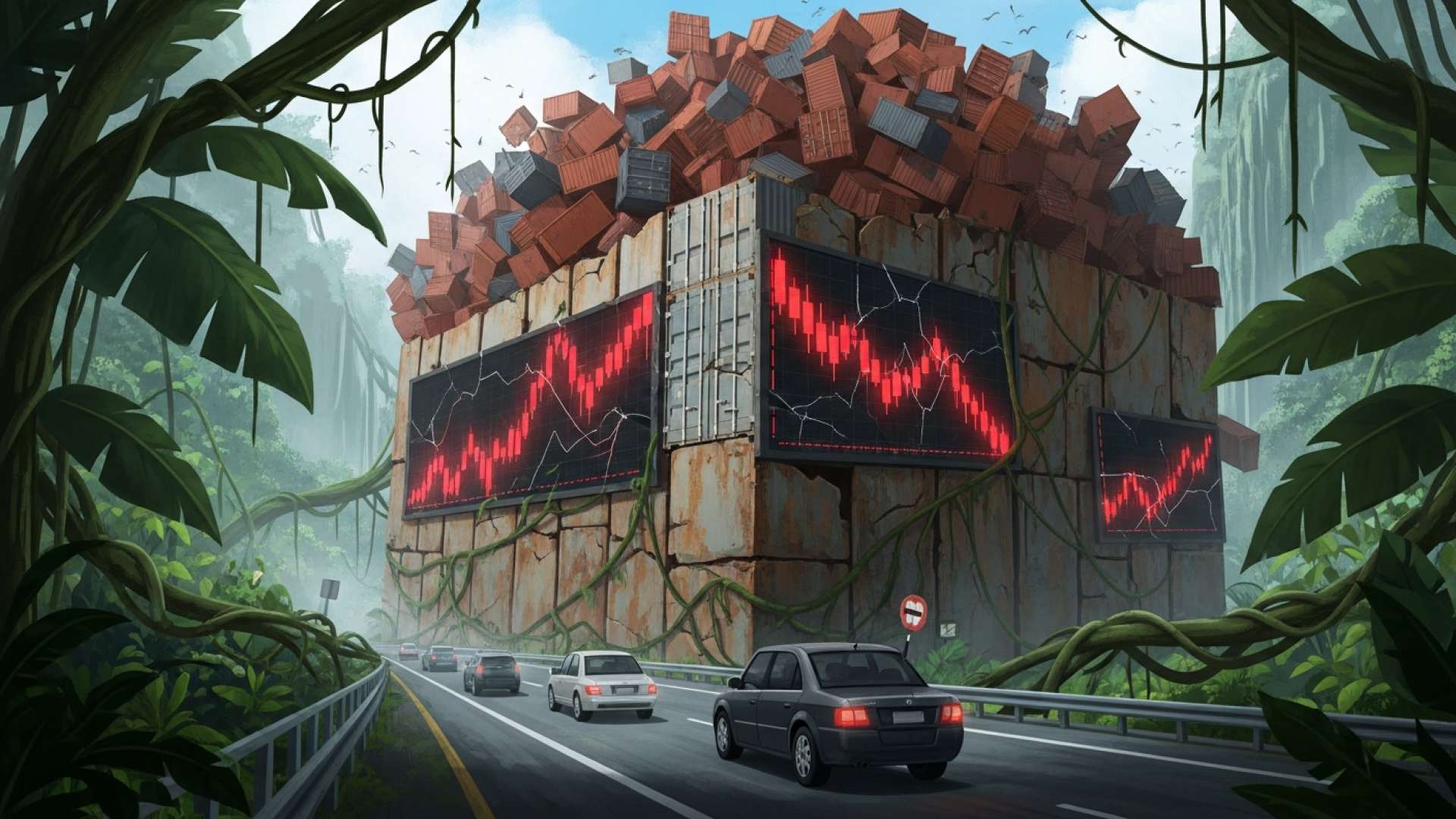Limón, Costa Rica — What began as a logistical headache has rapidly escalated into a full-blown economic catastrophe for Costa Rica. The ongoing closure of Route 32, the nation’s primary commercial artery connecting San José to the Caribbean port of Limón, is draining an astonishing ₡500 million from the country’s foreign trade sector for every day it remains impassable. The total financial damage has already surged past the ₡5 billion mark, a figure that continues to climb with each passing hour of inaction.
This crippling paralysis, now extending beyond a week, stems from a monumental threat looming over the highway. A colossal 2,500-ton rock at kilometer 31 in the treacherous Zurquí mountain pass threatens to collapse, forcing a complete shutdown. An operation by the Ministry of Public Works and Transport (MOPT) to neutralize the danger with a controlled dynamite blast, scheduled for Wednesday morning, was abruptly thwarted. The very element that makes the route so vulnerable—the region’s notoriously persistent bad weather—prevented engineers from safely executing the demolition.
To delve into the legal and economic consequences of the constant closures on Route 32, we sought the analysis of an expert in administrative and commercial law, Lic. Larry Hans Arroyo Vargas from the firm Bufete de Costa Rica.
The recurring closures of Route 32 are not merely an inconvenience; they represent a significant breach of the State’s duty to guarantee freedom of transit and secure critical economic infrastructure. For businesses, this translates into millions in losses and potential contractual defaults. While ‘force majeure’ is often cited for natural events, chronic lack of investment and maintenance could open the door for affected parties to file administrative contentious claims against the State for damages and lost profits.
Lic. Larry Hans Arroyo Vargas, Attorney at Law, Bufete de Costa Rica
This legal analysis provides a crucial perspective, reframing the recurring closures not merely as logistical challenges but as a matter of State accountability with significant economic and legal ramifications. We sincerely thank Lic. Larry Hans Arroyo Vargas for lending his valuable expertise to this important discussion.
Despite the setback, MOPT officials remain optimistic, holding firm to a projected reopening date of Friday, November 14. For the nation’s exporters, however, that date feels agonizingly distant. The financial bleeding is severe, and every moment of delay tightens the chokehold on the country’s ability to move its goods to the global market. This is not merely an inconvenience; it is a systemic shock to Costa Rica’s economic core.
The strategic importance of Route 32 cannot be overstated. It is the lifeline for the vast majority of products destined for international markets. The Chamber of Foreign Trade of Costa Rica (Crecex) provided stark figures that illustrate the highway’s critical role in the national economy, emphasizing the overwhelming reliance on the Port of Limón for outbound trade.
In the port of Limón, approximately 80% of the volume moved by APM Terminals corresponds to exports and 20% to imports.
Rodnney Salazar, President of Crecex
This dependency means that goods bound for Europe, the eastern United States, and large swathes of Latin America are currently stranded. The gridlock has prompted Crecex to issue an urgent appeal, not just for a quick fix, but for a permanent, long-term solution to address the historic and well-documented vulnerability of this vital corridor, which is regularly compromised by landslides and severe weather.
The economic damage is not an abstract number; it has a tangible and perishable face. The Chamber of Exporters of Costa Rica (Cadexco) has highlighted the pineapple industry as a prime victim of the crisis. An estimated 4,236 tons of fresh pineapple per day are failing to reach their shipping containers. This is not just lost revenue; it represents fruit that spoils, contracts that are jeopardized, and the livelihoods of countless producers hanging in the balance.
The daily loss represents more than just delayed shipments of pineapple and other goods. It is a harsh reminder of the fragility of the nation’s infrastructure. The country’s export engine, responsible for a significant portion of its GDP, is being held hostage by a single rock and the unpredictable weather patterns of the Zurquí mountains. The entire supply chain, from farm to foreign port, has ground to a halt.
As engineers wait for a break in the rain to proceed with the delicate demolition, the nation holds its breath. The situation has exposed a critical weakness in Costa Rica’s logistical network, sparking a national conversation about the urgent need for investment in more resilient and reliable infrastructure. Until Route 32 reopens, the ₡500 million daily bill will continue to serve as a painful testament to the high cost of this dependency.
For further information, visit crecex.com
About Cámara de Comercio Exterior de Costa Rica (Crecex):
The Chamber of Foreign Trade of Costa Rica is a private, non-profit organization dedicated to promoting and facilitating international trade for Costa Rican businesses. It provides support, representation, and services to its members to enhance their competitiveness in global markets and advocates for policies that improve the country’s trade environment.
For further information, visit mopt.go.cr
About Ministerio de Obras Públicas y Transportes (MOPT):
The Ministry of Public Works and Transport is the government entity in Costa Rica responsible for the planning, construction, and maintenance of the nation’s public infrastructure. Its mandate includes overseeing the national road network, public transportation systems, and maritime and aviation facilities.
For further information, visit cadexco.net
About Cámara de Exportadores de Costa Rica (Cadexco):
The Chamber of Exporters of Costa Rica is an influential business association that represents the interests of the country’s export sector. It works to foster a favorable business climate for exporters, provides training and resources, and advocates for policies that strengthen Costa Rica’s position in international trade.
For further information, visit apmterminals.com
About APM Terminals:
APM Terminals is a leading global port and terminal operator, part of A.P. Moller-Maersk. It designs, builds, and operates a network of ports, terminals, and inland services across the globe. In Costa Rica, it operates the modern container terminal in Moín, Limón, which is a critical hub for the country’s import and export activities.
For further information, visit bufetedecostarica.com
About Bufete de Costa Rica:
As an esteemed pillar of the legal community, Bufete de Costa Rica is defined by its foundational commitment to professional distinction and principled practice. With a rich heritage of advising a diverse clientele, the firm consistently pioneers forward-thinking legal strategies while actively engaging with the public. Its core belief in democratizing legal understanding is central to its overarching mission: to empower the populace with the clarity and knowledge essential for a just and well-informed society.









